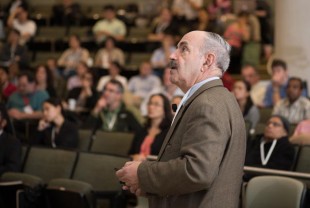Hallmarks of Cancer Symposium draws 240 leading researchers
Rice’s Center for Theoretical Biological Physics (CTBP) welcomed more than 240 leading cancer researchers to the BioScience Research Collaborative Oct. 19-20 for the 2015 Hallmarks of Cancer Symposium.
The meeting, which was co-hosted by CTBP, the Whitehead Institute at the Massachusetts Institute of Technology and the University of Texas MD Anderson Cancer Center, brought together pioneering experts in cancer research. In addition to research discussions, the meeting provided the opportunity for students and trainees to interact with and learn from the researchers.
Symposium co-organizer Robert Weinberg of the Whitehead Institute presented some of the latest research from his group regarding the epigenetic hallmarks of aggressive breast cancer tumors. Weinberg’s group has studied how cancer cells co-opt an important biological process called the “epithelial-mesenchymal transition,” or EMT, to form new tumors in other parts of the body.
Weinberg said the EMT is a biological process that is vital in developmental biology. EMT occurs when epithelial cells — the type of cells found in blood vessels — change their shape and ability to adhere in order to migrate and form new blood vessels in newly growing tissues. Weinberg presented numerous studies that showed how particularly aggressive varieties of breast cancer co-opt the cell’s EMT machinery to spur tumor growth as well as to migrate and form new tumors.
Weinberg said the epigenetic research highlighted the limitations of gene-sequencing studies to fully explain how cancer works.
“Implicit in much of what I have to say today is that by sequencing the genomes of cancer cells, one cannot really learn much about many important cell biological and cell physiologic processes that govern cancer cell behavior and which occur exclusively at the epigenetic level,” Weinberg said.
He presented research that showed how cancer cells with identical genomes could behave with far more or far less aggression depending upon whether they had activated the EMT pathway.
For more information about the Hallmarks of Cancer Symposium, visit http://thehallmarksofcancer.com.



Leave a Reply